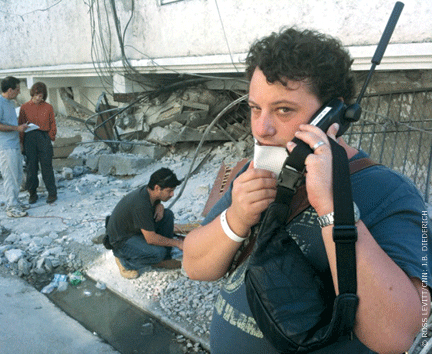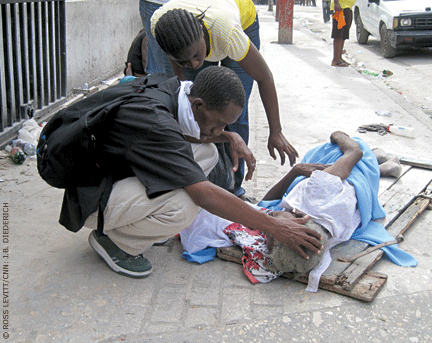
Class of ’97 | At 5:39 in the afternoon of January 12, Ross Levitt C’97 got a phone call from his bosses at CNN. Haiti had just been rocked by a 7.0 magnitude earthquake, and he was going to Port-au-Prince. He had half an hour to pack. His wife, Tracy Mitnick Levitt C’03, found herself hurrying towards a Manhattan pharmacy to find some malaria pills.
Ross Levitt had been working at CNN for more than three years and had been a field producer for just over a year, so this was not the first time he had found himself sent somewhere on short notice. He knew it was important to get to the airport in advance of his video journalists and Susan Candiotti, the national correspondent with whom he usually works. A producer is in charge of, among other things, keeping all the moving parts working together. In this case, that job included making sure everyone got on the plane.
None of them knew what kind of a situation they were flying into. There was little information coming out of Port-au-Prince. Since communications were down, CNN wanted the team “to tell them exactly where we are and where we are going at all times,” Levitt explains.
In the Dominican Republic, they learned that water was scarce on the ground in Haiti and that they had a flight to Port-au-Prince early the next morning. Levitt immediately bought 40 bottles of water and began charging his phones.
Flying in to Port-au-Prince the next morning, Levitt had an aerial view of the appalling devastation.
“You can see that the palace is completely in shambles,” he says. “You can see people gathering out on the streets. You can see large swaths of areas that are just completely rubble.”
After he landed, it became clear that the situation was even worse than it looked from the sky.
“Easily the most eye-opening part of my entire trip was this ride from the airport to our hotel in the dark,” Levitt says. “We’re driving through the streets and we just start seeing dead bodies: one after the other, and people who were wounded and buildings crumbled—and we didn’t know if buildings were going to continue to crumble.”
This was Levitt’s first assignment to a humanitarian crisis of this level. During that drive, he felt himself filled with compassion for Haitians “who were literally just sleeping in every single place where they could find a piece of grass or an open space, including the sidewalks,” he recalls. “Some were even closing down a lane of road just to sleep, because there just wasn’t enough room for everyone to sleep outside.
“It was heartbreaking,” he says convincingly. People did not even know whether their loved ones had survived the earthquake. “We were taking down the names of people who said they were OK and had family back in the States,” then forwarding those names back to CNN. For the most part, however, they knew the most important thing they could do was to get the word out about the magnitude of the crisis.
The hotel where they were staying was not fully operational, but it did have cold running water. The hotel staff had run a hose out to the street so that people there could get drinking water, which Levitt’s team filmed. Even before he left the hotel, he says, he realized “what a desperate situation it is when you’ve got this many people lined up just to fill up a bucket of water.”
On his second day, Levitt and his crew began reporting around the city. They soon came upon a man trapped alive under a collapsed school. His family had been trying all day to free him, despite the fact that the rest of the building could collapse at any moment. Candiotti—“a journalist’s journalist” who is “just phenomenal at what she does,” in Levitt’s estimation—began reporting live from outside the building.
Eventually, the man was freed, with Levitt’s team reporting the rescue. However, “this was just one man,” he notes. “We’re talking about thousands of people who might have been trapped, and this situation was playing out everywhere. This one just happened to be a few blocks from where we were staying.”

Each team was reporting on what it was finding, but no one on the ground had a sense of the bigger picture, since they had no access to television or the Internet. “We truly were reporting on what we were seeing right in front of us.”
Everywhere the crew went there was something to cover. At the morgue, they found the courtyard filled with dead bodies.
“We wonder, why are they leaving them out in the courtyard?” he recalls. “So finally we approach the morgue building itself—and the morgue is completely full of bodies, there’s no more room.”
Whether they were reporting on the collapsed city or on the rescue efforts, Levitt says he remained focused on getting first-rate coverage.
As Candiotti points out, “You never know in a situation like that what could happen next,” adding that they all slept with their clothes on, “flashlights in hand.” She says that while Levitt “saw some things for the first time that will stay with him for his whole life,” he never stopped thinking about his crew.
“He knows how to follow his instincts,” she says. “So when things get difficult, he knows how to observe and react cautiously. And on the other hand, when you need to get moving, he acts appropriately. I couldn’t have asked for a better partner there.”
Levitt, who was grateful for the opportunity to report on such a momentous story, emphasizes the teamwork of everyone he worked with in Haiti—including Anderson Cooper and Sanjay Gupta, the latter of whom stayed through the night at a hospital to care for patients.
After five days, the team was called home so that other crews could be sent into Haiti. Despite all the anxiety and uncertainty of reporting in such difficult conditions, Levitt says that the “toughest part of the entire journey was leaving,” because he felt that he was “abandoning people in need.” He was going home to his wife and loved ones, and he wished he could have given more direct aid.
And yet, he says: “Even though we weren’t rescue workers, I knew that by telling the world the story of what happened in Haiti, we were making a difference in our own way.”
— Emily Rosenbaum C’95 G’Ed’96




